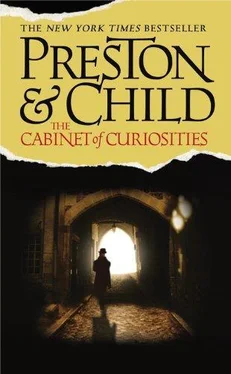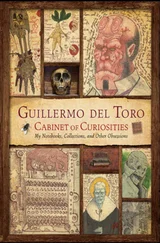Douglas Preston - The Cabinet of Curiosities
Здесь есть возможность читать онлайн «Douglas Preston - The Cabinet of Curiosities» весь текст электронной книги совершенно бесплатно (целиком полную версию без сокращений). В некоторых случаях можно слушать аудио, скачать через торрент в формате fb2 и присутствует краткое содержание. Жанр: Триллер, на английском языке. Описание произведения, (предисловие) а так же отзывы посетителей доступны на портале библиотеки ЛибКат.
- Название:The Cabinet of Curiosities
- Автор:
- Жанр:
- Год:неизвестен
- ISBN:нет данных
- Рейтинг книги:3 / 5. Голосов: 1
-
Избранное:Добавить в избранное
- Отзывы:
-
Ваша оценка:
- 60
- 1
- 2
- 3
- 4
- 5
The Cabinet of Curiosities: краткое содержание, описание и аннотация
Предлагаем к чтению аннотацию, описание, краткое содержание или предисловие (зависит от того, что написал сам автор книги «The Cabinet of Curiosities»). Если вы не нашли необходимую информацию о книге — напишите в комментариях, мы постараемся отыскать её.
The Cabinet of Curiosities — читать онлайн бесплатно полную книгу (весь текст) целиком
Ниже представлен текст книги, разбитый по страницам. Система сохранения места последней прочитанной страницы, позволяет с удобством читать онлайн бесплатно книгу «The Cabinet of Curiosities», без необходимости каждый раз заново искать на чём Вы остановились. Поставьте закладку, и сможете в любой момент перейти на страницу, на которой закончили чтение.
Интервал:
Закладка:
Pendergast paused momentarily. In the silence, his hyperacute sense of hearing picked up a very faint scratching: colonies of silverfish, gorging their way through an endless supply of pulp.
And there was another sound, too: louder and sharper. Snip.
Pendergast turned toward the sound, tracking it through the stacks of books, angling first one way, then another. The sound grew nearer.
Snip. Snip.
Up ahead, Pendergast made out a halo of light. Turning a final corner, he saw a large wooden table, brilliantly lit by a dentist’s O-ring lamp. Several objects were arrayed along one edge of the table: needle, a spool of heavy filament, a pair of white cotton gloves, a bookbinder’s knife, a glue pen. Next to them was a stack of reference works: Blades’s The Enemies of Books ; Ebeling’s Urban Entomology ; Clapp’s Curatorial Care of Works of Art on Paper. On a book truck beside the table sat a tall pile of old volumes in various states of decomposition, covers frayed, hinges broken, spines torn.
A figure sat at the table, back to Pendergast. A confusion of long hair, white and very thick, streamed down from the skull onto the hunched shoulders. Snip.
Pendergast leaned against the nearest stack and — keeping a polite distance — rapped his knuckles lightly against the metal.
“I hear a knocking,” the figure quoted, in a high yet clearly masculine tone. He did not turn his head. Snip.
Pendergast knocked again.
“Anon, anon!” the man responded.
Snip.
Pendergast knocked a third time, more sharply.
The man straightened his shoulders with an irritable sigh. “Wake Duncan with thy knocking!” he cried. “I would thou couldst.”
Then he laid aside a pair of library scissors and the old book he had been rebinding, and turned around.
He had thin white eyebrows to match the mane of hair, and the irises of his eyes were yellow, giving him a gaze that seemed leonine, almost feral. He saw Pendergast, and his old withered face broke into a smile. Then he caught sight of the package beneath Pendergast’s arm, and the smile broadened.
“If it isn’t Special Agent Pendergast!” he cried. “The extra-special, Special Agent Pendergast.”
Pendergast inclined his head. “How are you, Wren?”
“I humbly thank thee, well, well.” The man gestured a bony hand toward the book truck, the pile of books waiting to be repaired. “But there is so little time, and so many damaged children.”
The New York Public Library harbored many strange souls, but none was stranger than the specter known as Wren. Nobody seemed to know anything about him: whether Wren was his first name, or his last, or even his real name at all. Nobody seemed to know where he’d come from, or whether he was officially employed by the library. Nobody knew where or what he ate — some speculated that he dined on library paste. The only things known about the man was that he had never been seen to leave the library, and that he had a pathfinder’s instinct for the lost treasures of the seventh level.
Wren looked at his guest, venal yellow eyes sharp and bright as a hawk’s. “You don’t look like yourself today,” he said.
“No doubt.” Pendergast said no more, and Wren seemed not to expect it.
“Let’s see. Did you find — what was it again? Oh, yes — that old Broadway Water Company survey and the Five Points chapbooks useful?”
“Very much so.”
Wren gestured toward the package. “And what are you lending me today, hypocrite lecteur? ”
Pendergast leaned away from the bookcase, brought the package out from beneath his arm. “It’s a manuscript of Iphigenia at Aulis, translated from the ancient Greek into Vulgate.”
Wren listened, his face betraying nothing.
“The manuscript was illuminated at the old monastery of Sainte-Chapelle in the late fourteenth century. One of the last works they produced before the terrible conflagration of 1397.”
A spark of interest flared in the old man’s yellow eyes.
“The book caught the attention of Pope Pius III, who pronounced it sacrilegious and ordered every copy burnt. It’s also notable for the scribbles and drawings made by the scribes in the margins of the manuscript. They are said to depict the lost text of Chaucer’s fragmentary ‘Cook’s Tale.’ ”
The spark of interest abruptly burned hot. Wren held out his hands.
Pendergast kept the package just out of reach. “There is one favor I’d request in return.”
Wren retracted his hands. “Naturally.”
“Have you heard of the Wheelwright Bequest?”
Wren frowned, shook his head. White locks flew from side to side.
“He was the president of the city’s Land Office from 1866 to 1894. He was a notorious pack-rat, and ultimately donated a large number of handbills, circulars, broadsides, and other period publications to the Library.”
“That explains why I haven’t heard of it,” Wren replied. “It sounds of little value.”
“In his bequest, Wheelwright also made a sizable cash donation.”
“Which explains why the bequest would still be extant.”
Pendergast nodded.
“But it would have been consigned to the seventh level.”
Pendergast nodded again.
“What’s your interest, hypocrite lecteur? ”
“According to the obituaries, Wheelwright was at work on a scholarly history of wealthy New York landowners when he died. As part of his research, he’d kept copies of all the Manhattan house deeds that passed through his office for properties over $1,000. I need to examine those house deeds.”
Wren’s expression narrowed. “Surely that information could be more easily obtained at the New-York Historical Society.”
“Yes. So it should have been. But some of the deeds are inexplicably missing from their records: a swath of properties along Riverside Drive, to be precise. I had a man at the Society look for them, without success. He was most put out by their absence.”
“So you’ve come to me.”
In response, Pendergast held out the package.
Wren took it eagerly, turned it over reverently in his hands, then slit the wrapping paper with his knife. He placed the package on the table and began carefully peeling away the bubble wrap. He seemed to have abruptly forgotten Pendergast’s presence.
“I’ll be back to examine the bequest — and retrieve my illuminated manuscript — in forty-eight hours,” Pendergast said.
“It may take longer,” Wren replied, his back to Pendergast. “For all I know, the bequest no longer exists.”
“I have great faith in your abilities.”
Wren murmured something inaudible. He donned the gloves, gently unbuckled the cloisonné enamel fastenings, stared hungrily at the hand-lettered pages.
“And Wren?”
Something in Pendergast’s tone made the old man look over his shoulder.
“May I suggest you find the bequest first, and contemplate the manuscript later? Remember what happened two years ago.”
Wren’s face took on a look of shock. “Agent Pendergast, you know I always put your interests first.”
Pendergast looked into the crafty old face, now full of hurt and indignation. “Of course you do.”
And then he abruptly vanished into the shadowy stacks.
Wren blinked his yellow eyes, then turned his attention back to the illuminated manuscript. He knew exactly where the bequest was — it would be a work of fifteen minutes to locate. That left forty-seven and three-quarter hours to examine the manuscript. Silence quickly returned. It was almost as if Pendergast’s presence had been merely a dream.
SEVEN
Интервал:
Закладка:
Похожие книги на «The Cabinet of Curiosities»
Представляем Вашему вниманию похожие книги на «The Cabinet of Curiosities» списком для выбора. Мы отобрали схожую по названию и смыслу литературу в надежде предоставить читателям больше вариантов отыскать новые, интересные, ещё непрочитанные произведения.
Обсуждение, отзывы о книге «The Cabinet of Curiosities» и просто собственные мнения читателей. Оставьте ваши комментарии, напишите, что Вы думаете о произведении, его смысле или главных героях. Укажите что конкретно понравилось, а что нет, и почему Вы так считаете.










